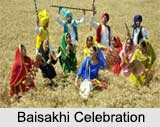 Baisakhi is a famous historical and spiritual popular festival in India which is famous in the state of Punjab. As per the "Nanakshahi" calendar and the "Mool Nanakshahi" Calendar, Baisakhi is celebrated on April 14 every year.
Baisakhi is a famous historical and spiritual popular festival in India which is famous in the state of Punjab. As per the "Nanakshahi" calendar and the "Mool Nanakshahi" Calendar, Baisakhi is celebrated on April 14 every year.
History of Baisakhi
For Sikhs, Baisakhi marks the foundation of the Khalsa community of Sikhs by Guru Gobind Singh. The Khalsa tradition started in the year 1699. Since 2003, the Sikh Gurdwara Prabhandak Committee named it Baisakh (Vaisakh), making the first day of the second month of Baisakh according to its new Nanakshahi calendar. The main celebrations are held at Anandpur Sahib and at Muktsar. All those who receive "Amrit" from five baptized Sikhs, will be infused with the spirit of courage and strength to sacrifice. Thus with these principles, he established Panth Khalsa, the Order of the Pure Ones.
Celebration of Baisakhi
Baisakhi is a harvest festival for the people of Punjab which also marks the Punjabi New Year. This day is observed as a prayer day by farmers where the farmers pay their tribute by thanking God for the rich harvest with praying for future wealth as well. Sikhs celebrate this very important day of their religion with joy and devotion. They take an early bath and wear new clothes. Every Sikh visits on this day the largest gurudwara. If possible Sikhs visit the Golden Temple at Amritsar and take a bath in the pool of Immortality. They also participate in the special prayer meet marked for the day. Major celebrations of Baisakhi are organized at Golden Temple, Amritsar where the Khalsa Panth was founded. After a special "Ardas of kirtans" (religious songs) and discourses, "Kada Prasad" (sweetened semolina) is distributed amongst the devotees. Later, people sit in rows to relish the "langar" or community lunch prepared and served by "kar sevaks" or volunteers.
The main religious function is reading of Granth Sahib, where it is read from beginning to end for 2 days and nights and is called Akhand Path. The Granth is taken out in procession to the accompaniment of music. The procession is called is called "Nagar Kirtan". The five men walk in front of the `Granth` with drawn out swords in memory of "Panch Pyare" of Guru Gobind Singh. Men, women and children alike participate in the Baiskhi processions with enthusiasm. In Punjab, the robust farming communities celebrate with rambunctious songs and dances. While the men dance the traditional Bhangra with energy and zest, the women folk join in with the Giddha dance. "Melas" or fairs are held over a couple of days and people participate in the fun, games and entertainment. Even mock fights and a band playing religious tunes make Baisakhi processions quite colourful and exciting. The dance is simple in movement but is extremely energetic and is performed in groups on the beat of dhol. Later in the evening, people exchange greetings with friends and relatives usually with a box of sweets or other traditional gifts.
Even the farmers in Uttar Pradesh and Haryana, celebrate the festival of Baisakhi with lot of joy and enthusiasm, since for them Baisakhi marks the time for harvest of rabi crops. This is a time of hard work but also a time when the community gathers together to mark the end of a successful agricultural season. Prosperous with the bountiful produce they look forward to celebrating Baisakhi with all eagerness. Cries of "Jatta aayi Baisakhi" ring in the skies as gaily-dressed men and women move towards the fields to celebrate the occasion. Farmers also celebrate Baisakhi as a Thanksgiving Day and the offerings are usually in the form of the first crop harvested. Homes are cleaned and decorated with garlands of mango leaves and marigold flowers. After taking an early bath in ponds or rivers people visit gurdwaras to express gratitude to the Almighty for the bountiful harvest and pray for prosperity and good times in future.



















